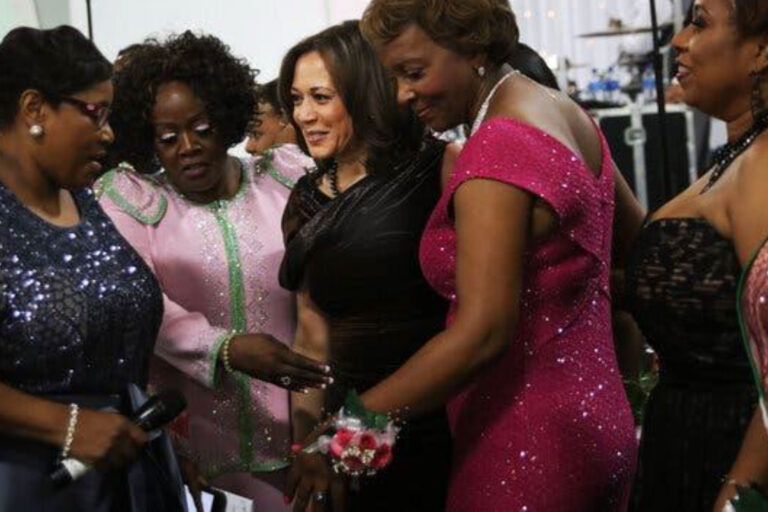Wisconsin: Harris's candidacy is a call to action for members of the 'Divine Nine.
By Kay Nolan
Oct. 17, 2020

Senator Kamala Harris at an Alpha Kappa Alpha sorority gala in 2019. Ms. Harris became a member of A.K.A. as an undergraduate at Howard University.
MILWAUKEE — When Mr. Biden named Senator Kamala Harris as his running mate, many leaders of color here instantly recognized a “sister” in the vice-presidential nominee.
That’s because Ms. Harris is a member of the Alpha Kappa Alpha sorority, one of nine historically Black sororities and fraternities known as the Divine Nine.
Members of the Divine Nine have a strong presence in Wisconsin activism and politics, and Ms. Harris’s presence on the Democratic ticket has helped energize their efforts in this election year — one already marked by unrest over racial inequality, a pandemic that has disproportionately affected people of color and fears of voter suppression.
In Milwaukee — a city ranked among the worst places in the nation to be Black according to metrics like employment, education and incarceration — Black voters are hearing an increasingly vocal and unified message from neighbors they trust.
When Ms. Harris debated Vice President Mike Pence this month, about 25 members of Alpha Kappa Alpha’s Marquette University chapter, Mu Beta, gathered for a watch party via Zoom.
“The question about racial justice was really important and could be a deciding factor for voters,” said JaMisha Matos, one of the people on the call.
Camille Willis, who was also watching, noted how Ms. Harris attacked Mr. Trump’s record on judges. “I didn’t know Trump didn’t appoint any African-Americans to the federal appellate court,” she said.
Jasmine M. Johnson, 39, who is a member of the Delta Sigma Theta sorority and holds a master’s degree in management, said in an interview that Ms. Harris’s nomination was empowering. “In corporate America, I almost never interact with someone who looks like me” in high-ranking positions, she said.
It also re-energized the coalition Ms. Johnson spearheaded in 2018 to merge the efforts of 15 local Black community organizations — including the N.A.A.C.P., Jack and Jill of America, the Milwaukee Urban League, the Links and Divine Nine chapters — to hold voter registration drives and candidate forums and staff local polling sites on Election Day.
While the Divine Nine, like other nonprofit groups, do not endorse political candidates, Ms. Johnson said their “unified messaging” stressed voting and health care rights.
Ms. Johnson said much of the negative pushback toward the Biden-Harris campaign that she was hearing was often related to Ms. Harris’s record as a prosecutor. “Folks are paying attention to how many Black men she locked up,” Ms. Johnson said. “She could benefit by spending time on that issue.”
Several Black Wisconsin politicians are Divine Nine members, including Lt. Gov. Mandela Barnes, State Senator Lena Taylor and State Representative LaKeshia Myers, all of Milwaukee; and State Representative Shelia Stubbs of Madison.
Some of them appeared in a “Divine 9 Weekend of Excellence” voter motivation video last month. “Our Black and brown communities have been dealt the hardest impact of the pandemic,” Mr. Barnes said, citing “historic numbers of people out of work” across the state.
Ms. Stubbs warned that “many out there would like our voting suppressed.”
Nadiyah Groves, 40, the Biden campaign’s Milwaukee director, said Wisconsinites of color paid attention to college-educated leaders.
“There’s a fondness and support there because we come from those communities,” said Ms. Groves, a former president of the Milwaukee branch of the National Pan-Hellenic Council, the Divine Nine’s umbrella organization.
“It’s about being real and authentic,” she said. “I’m from the 53206 ZIP code — I’ve lived that experience,” she added, referring to an impoverished Milwaukee neighborhood that is 95 percent Black and known for its high incarceration rate.